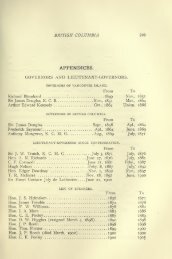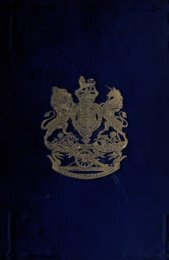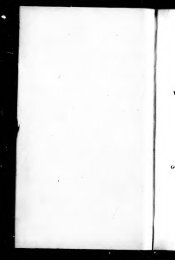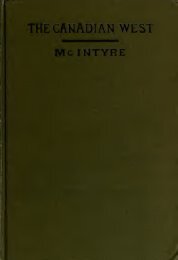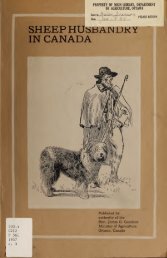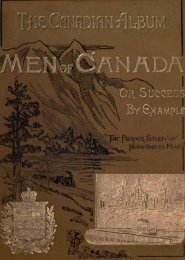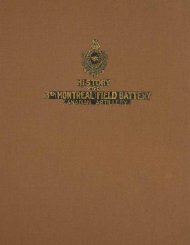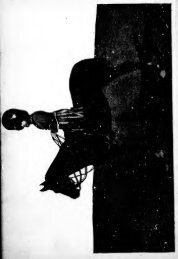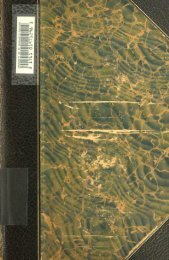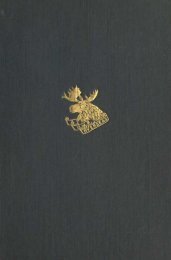Royal Scots of Canada Highlanders - Electric Scotland
Royal Scots of Canada Highlanders - Electric Scotland
Royal Scots of Canada Highlanders - Electric Scotland
Create successful ePaper yourself
Turn your PDF publications into a flip-book with our unique Google optimized e-Paper software.
Service in the Seventies in Aid <strong>of</strong> the Civil Power<br />
Historical Ceremonial Parades<br />
If there is any particular class <strong>of</strong> service which is<br />
especially distasteful to a citizen soldiery it is that in aid<br />
<strong>of</strong> the civil power, and the reason this class <strong>of</strong> service is<br />
so unpopular it is easy for any one to understand. If it<br />
is distasteful, it is nevertheless, a duty, and the Fifth<br />
<strong>Royal</strong>s have never shirked it. They have had an exceptional<br />
lot <strong>of</strong> such service too, and the first <strong>of</strong> it came<br />
very soon after the reorg'anization <strong>of</strong> the regiment as the<br />
5th <strong>Royal</strong> Fusileers. As a matter <strong>of</strong> fact the movement<br />
for the reorganization was to some extent assisted by<br />
the anxiety produced by the outbreak <strong>of</strong> ill-feeling and<br />
lawlessness, which developed from the regrettable incident<br />
known as the Guibord Affair, (i)<br />
The discussion over the points involved in this dispute<br />
was kept up for some time, ugly words were used<br />
on both sidtes,<br />
and narrow sectarianism reigned supreme<br />
not only in Montreal, but throughout the whole vicinit}^<br />
Orangeism expanded rapidly on one side and new<br />
branches <strong>of</strong> the Irish Catholic Union, and similar organizations<br />
sprang into existence on tne other. Threats<br />
were made and challenges thrown down. The local<br />
Orangemen, spurred on by the taunts <strong>of</strong> the opposite<br />
party, and carried away by the enthusiasm engendered<br />
by the recent accession to their numerical strength,<br />
and<br />
by the defeat <strong>of</strong> the Church party in the Guibord matter,<br />
took steps towards holding a triumphant procession<br />
in Montreal on the succeeding Twelfth <strong>of</strong> July. This it<br />
was feared would precipitate a serious breach <strong>of</strong> the<br />
peace, and the Orangemen were asked to desist. For<br />
some time the Orangemen persisted, but calmer counsels<br />
prevailed, and the procession was cancelled, this sensible<br />
decision being followed by charges <strong>of</strong> cowardice against<br />
the members <strong>of</strong> the order. The very natural consequence<br />
was that the question <strong>of</strong> holding a procession the<br />
following Twelfth <strong>of</strong> July (1877) was soon broached, and<br />
(1) Joseph Guibord was a printer and a member <strong>of</strong> the Institut Canadien,<br />
which was put under the ban <strong>of</strong> the Roman Catholic Church (burial in consecrated<br />
ground being forbidden the members) for keeping preset ibed books<br />
in its library. GuitK)rd, who died Nov. 20th, 1S69, owned a lot in the Roman<br />
Catholic Cemetery, and his widow took proceedings in the courts to secure his<br />
interment therein She dying, the case was prosecuted by the Institut Canadien.<br />
Novemljer 28th' 1874, a decree <strong>of</strong> the Judicial Committee <strong>of</strong> the Imperial<br />
Privy Council, the highest court in the realm, was issued, ordering the interment<br />
to take place ; and an attempt was made to carry this into effect September<br />
2, 1875, the hearse being stoned and turned back by a mob gathered at<br />
the Roman Catholic Cemetery gates. The interment finally took place, under<br />
protection <strong>of</strong> the whole Montreal militia brigade, November 16, 1875.<br />
decided upon. As the date approached, the excitement<br />
became intense. As threats to raid the armories <strong>of</strong> the<br />
city corps had b«en made, the militia authorities instructed<br />
Lieut.-Colonel P^letcher, D.A.G., to place guards<br />
on the armories, which were then temporarily situated<br />
in the ruins <strong>of</strong> the old drill shed on the site <strong>of</strong> the psesent<br />
structure on Craig street, and in the old Quebec<br />
Gate Barracks, which were situated on Commissioners<br />
street, on the site at present occupied by the C.P.R.,<br />
east end freight <strong>of</strong>fices,<br />
Berri street.<br />
So evident was it that in the prevailing temper <strong>of</strong><br />
the community, a public procession <strong>of</strong> the Orangemen<br />
would produce disturbance, that a couple <strong>of</strong> days before<br />
the Twelfth, Mr. John Kerry, President <strong>of</strong> the St.<br />
George's Society, Mr. Ewan McLennan, President <strong>of</strong> the<br />
St. Andrew's Society, and Mr. W.- J. McMaster, President<br />
<strong>of</strong> the Irish Protestant Benevolent Society, waited<br />
on the local <strong>of</strong>ficers <strong>of</strong> the Orange order to dissuade<br />
them from holding their procession. They succeeded<br />
after some trouble, the Orangemen agreeing to abandon<br />
their procession in the interests <strong>of</strong> public peace, contenting<br />
themselves with going singly to Knox Church to<br />
hear a special sermon delivered in commemoration <strong>of</strong> the<br />
day.<br />
Although the procession<br />
was abandoned, trouble was<br />
feared owing to public feeling being wrought to such a<br />
high tension, and the<br />
ihree representatives <strong>of</strong> the national<br />
societies, called upon the mayor and the civic authorities<br />
generally to take steps for the preservation <strong>of</strong> the<br />
peace.<br />
But nothing <strong>of</strong> any practical character was done,<br />
and a noisy mob, including many <strong>of</strong> the worst characters<br />
in the city, gathered on Victoria Sc^uare. Several<br />
citizens were molested, and about half pasi one, a young<br />
Orangeman, named Thomas Lett Racket, who while returning<br />
quietly to his <strong>of</strong>fice from the service in Knox<br />
Church had gone to the assistance <strong>of</strong> another man molested<br />
by some <strong>of</strong> the mob, was shot dead, and several<br />
revolver bullets fired into his body. Instantly the excitement<br />
throughout ihe city reached fever heat, and very<br />
grave consequences were feared.<br />
Lieut.-Colonel Fletcher, D.A.G., <strong>of</strong> the 5th Military<br />
District, at once issued orders to the <strong>of</strong>ficers commanding<br />
the Troop <strong>of</strong> Cavalry, Montreal Engineers, Garrison<br />
Artillery, ist Prince <strong>of</strong> Wales Rifles, 3rd Victoria Rifles,



